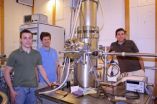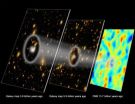(Press-News.org) Boulder, Colorado, USA – The April/May GSA Today science article is now online at www.geosociety.org/gsatoday/. In this issue, Simon Williams and colleagues from the Earthbyte Group of the School of Geosciences at the University of Sydney present GPlates, a powerful new method for analyzing geological and geophysical data sets within the context of tectonic reconstructions.
GPlates is part of a new generation of plate reconstruction software that incorporates functionality familiar from GIS software with the added dimension of geological time. By enabling the user to rapidly visualize a diverse range of geological and geophysical constraints within different tectonic reconstructions, the implications of different tectonic models for reconciling a variety of observations can be investigated with ease, allowing more informed choices to be made between different models and data. To illustrate the application of this software, the authors explore alternative tectonic models for the assembly of Western Australia and the configuration of Rodinia by using GPlates to reconstruct geological terranes, geophysical grids, and paleomagnetic data relevant to the reconstructions.
###
An open-source software environment for visualizing and refining plate tectonic reconstructions using high-resolution geological and geophysical data sets
Simon E. Williams et al., University of Sydney, Earthbyte Group, Madsen Building F09, School of Geosciences, Sydney NSW 2006, Australia. Pages 4-9, doi: 10.1130/GSATG139A.1.
GSA Today is The Geological Society of America's science and news magazine for members and other earth scientists. Refereed lead science articles present exciting new research or synthesize important issues in a format understandable to all in the earth science community. GSA Today often features a refereed "Groundwork" article – tightly focused papers on issues of import to earth science policy, planning, funding, or education. All GSA Today articles are open access at www.geosociety.org/pubs/.
New advances in plate reconstruction: Earthbyte group presents GPlates
April-May 2012 GSA Today now online
2012-04-02
ELSE PRESS RELEASES FROM THIS DATE:
Microprocessors from pencil lead
2012-04-02
Graphite, more commonly known as pencil lead, could become the next big thing in the quest for smaller and less power-hungry electronics.
Resembling chicken wire on a nano scale, graphene – single sheets of graphite – is only one atom thick, making it the world's thinnest material. Two million graphene sheets stacked up would not be as thick as a credit card.
The tricky part physicists have yet to figure out how to control the flow of electrons through the material, a necessary prerequisite for putting it to work in any type of electronic circuit. Graphene behaves very ...
MRI and neuropsychological tests best predict Alzheimer's disease in old patients
2012-04-02
Amsterdam, NL -- Investigators from the University of Amsterdam, Netherlands, have shown that in most elderly patients invasive and expensive techniques, i.e. lumbar puncture and PET scan, are not useful to establish the diagnosis of Alzheimer's disease. They arrived at this conclusion after analysis of data from the Alzheimer's Disease Neuroimaging Initiative (ADNI), a large collaborative research project of medical centers in the USA and Canada.
The Dutch researchers divided the ADNI sample into two halves, a younger (74 y). They showed that the CSF biomarkers (amyloid ...
Immune therapies: The next frontier in battle against atherosclerosis
2012-04-02
London -- New strategies injecting cardiovascular disease (CVD) patients with vaccines and monoclonal antibodies to combat atherosclerosis could soon change the treatment landscape of heart disease. Both approaches, Professor Jan Nilsson told delegates at the Frontiers in CardioVascular Biology (FCVB) 2012 meeting, can be considered truly ground breaking since for the first time they target the underlying cause of CVD. The FCVB meeting, organised by the Council on Basic Cardiovascular Science (CBCS) of the European Society of Cardiology (ESC), held 30 March to 1 April at ...
Children who develop asthma have lung function deficits as neonates
2012-04-02
Children who develop asthma by age seven have deficits in lung function and increased bronchial responsiveness as neonates, a new study from researchers in Denmark suggests.
"Previous research on the relationship between neonatal lung function and the development of asthma has been conflicting," said lead author Hans Bisgaard, MD, DMSci, professor of pediatrics at the University of Copenhagen and head of the Danish Pediatric Asthma Centre. "Our study shows that children with asthma by age seven already had significant airflow deficits and increased bronchial responsiveness ...
CDC study forges link between depression and sleep apnea
2012-04-02
DARIEN, IL – Obstructive sleep apnea and other symptoms of OSA are associated with probable major depression, regardless of factors like weight, age, sex or race, according to a new study from the Centers for Disease Control and Prevention. There was no link between depression and snoring.
"Snorting, gasping or stopping breathing while asleep was associated with nearly all depression symptoms, including feeling hopeless and feeling like a failure," said Anne G. Wheaton, PhD, lead author of the study. "We expected persons with sleep-disordered breathing to report trouble ...
Middle-of-the-night PCIs do not adversely affect success of next-day procedures
2012-04-02
A single-center study found that percutaneous coronary intervention (PCI) procedures performed during the middle of the night do not adversely affect the safety and effectiveness of procedures performed the next day by the same operator. Findings now available in Catheterization and Cardiovascular Interventions, a journal published by Wiley-Blackwell on behalf of The Society for Cardiovascular Angiography and Interventions (SCAI), show late night work while on call does not worsen performance of the interventionist doing PCIs the next day.
Studies have shown that sleep ...
Making mice comfy leads to better science, Stanford researcher says
2012-04-02
STANFORD, Calif. — Nine out of 10 drugs successfully tested in mice and other animal models ultimately fail to work in people, and one reason may be traced back to a common fact of life for laboratory mice: they're cold, according to a researcher at the Stanford University School of Medicine.
Laboratory mice, which account for the vast majority of animal research subjects, are routinely housed in chilly conditions, which may affect their well-being as well as the outcome of research studies, said Joseph Garner, PhD, associate professor of comparative medicine.
"If you ...
Starvation linked to greater risk of cardiac complications
2012-04-02
London -- Russians born during the Leningrad Siege in World War II, which was responsible for some of the greatest losses of civilian life in history, are giving scientists new strategies to identify people who experienced intrauterine growth restriction (IUGR) and starvation during childhood at greatest risk of developing long term heart complications. The abstract study¹, presented at the Frontiers in CardioVascular Biology (FCVB) meeting, in London, UK, 30 March to 1 April 2012, makes use of a unique population of people exposed to extreme starvation both as foetuses ...
Clocking an accelerating universe: First results from BOSS
2012-04-02
Some six billion light years ago, almost halfway from now back to the big bang, the universe was undergoing an elemental change. Held back until then by the mutual gravitational attraction of all the matter it contained, the universe had been expanding ever more slowly. Then, as matter spread out and its density decreased, dark energy took over and expansion began to accelerate.
Today BOSS, the Baryon Oscillation Spectroscopic Survey, the largest component of the third Sloan Digital Sky Survey (SDSS-III), announced the most accurate measurement yet of the distance scale ...
Benefits of taking Fido to work may not be far 'fetched'
2012-04-02
RICHMOND, Va. (March 30, 2012) – Man's best friend may make a positive difference in the workplace by reducing stress and making the job more satisfying for other employees, according to a Virginia Commonwealth University study.
Stress is a major contributor to employee absenteeism, morale and burnout and results in significant loss of productivity and resources. But a preliminary study, published in the March issue of the International Journal of Workplace Health Management, found that dogs in the workplace may buffer the impact of stress during the workday for their ...
LAST 30 PRESS RELEASES:
Nanoplastics can interact with Salmonella to affect food safety, study shows
Eric Moore, M.D., elected to Mayo Clinic Board of Trustees
NYU named “research powerhouse” in new analysis
New polymer materials may offer breakthrough solution for hard-to-remove PFAS in water
Biochar can either curb or boost greenhouse gas emissions depending on soil conditions, new study finds
Nanobiochar emerges as a next generation solution for cleaner water, healthier soils, and resilient ecosystems
Study finds more parents saying ‘No’ to vitamin K, putting babies’ brains at risk
Scientists develop new gut health measure that tracks disease
Rice gene discovery could cut fertiliser use while protecting yields
Jumping ‘DNA parasites’ linked to early stages of tumour formation
Ultra-sensitive CAR T cells provide potential strategy to treat solid tumors
Early Neanderthal-Human interbreeding was strongly sex biased
North American bird declines are widespread and accelerating in agricultural hotspots
Researchers recommend strategies for improved genetic privacy legislation
How birds achieve sweet success
More sensitive cell therapy may be a HIT against solid cancers
Scientists map how aging reshapes cells across the entire mammalian body
Hotspots of accelerated bird decline linked to agricultural activity
How ancient attraction shaped the human genome
NJIT faculty named Senior Members of the National Academy of Inventors
App aids substance use recovery in vulnerable populations
College students nationwide received lifesaving education on sudden cardiac death
Oak Ridge National Laboratory launches the Next-Generation Data Centers Institute
Improved short-term sea level change predictions with better AI training
UAlbany researchers develop new laser technique to test mRNA-based therapeutics
New water-treatment system removes nitrogen, phosphorus from farm tile drainage
Major Canadian study finds strong link between cannabis, anxiety and depression
New discovery of younger Ediacaran biota
Lymphovenous bypass: Potential surgical treatment for Alzheimer's disease?
When safety starts with a text message
[Press-News.org] New advances in plate reconstruction: Earthbyte group presents GPlatesApril-May 2012 GSA Today now online

